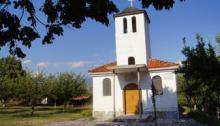Ronelle Alexander

| now adv | child pl n def | this pl adj | child pl n | hort | dat 2sg clt | tell 1pl pres P |
| from | twelve | year f pl | 1sg pres aux clt | begin sg f L.part P | bread sg m | comp | knead 1sg pres I | one sg n adj | time sg n |
| neg | 3sg pres cop clt | when | now adv | comp | dat 1pl clt | bring 3pl pres I | bread sg m | knead 1pl impf I | dat refl clt | domestic sg m adj |
| have 1pl pres I | one sg n adj | stool sg n | kneading.trough pl.t | dat refl clt | have 1pl pres I | such pl adj | wooden pl adj | there adv | dat refl clt | all adv | stand 3pl aor I |
| bkch |
| step 1sg pres P | on | stool sg n def | and | knead 2sg pres I |
| and | knead 2sg pres I |
| and | knead 2sg pres I | yes |
| and | where interr | acc m 3sg clt | bake 2sg pres I |
| disc | such sg f adj | oven sg f | have 1pl pres I | ost | ost | ost | ost | now adv | there adv | have 1pl pres I | disc |
| bkch |
| behind | carriage sg f def |
| bkch |
| in | oven sg f def |
| in | oven sg f | there adv |
| in | that sg f adj | oven sg f |
| yes |
| disc |
| there adv | acc m 3sg clt | bake 1sg pres I |
|
bkch
|
| remove 1sg pres I | acc m 3sg clt | and | mother f sg | dat 1sg clt | and | father sg m | dat 1sg clt | reap 3pl pres I | plow 3pl pres I | there adv |
| have 1pl pres I | sheep pl f | have 1pl pres I | goat pl f |
| bkch |
| have pl impf I | ox pl m | have 1pl impf I | mare sg f | disc | early adv | have 1sg pres I | carry.sack sg f |
| shoulder 1sg pres P | bread sg m def | and | dat 3pl clt | carry 1sg pres P | there adv | in | field sg f def |
| nom 2sg | at.home adv | bake 2sg pres I | nom 2sg | and | work 2sg pres I |
| nom 3pl | thus adv |
| disc |
| yes |
| and | nom 3pl | work 3pl pres I |
| disc | disc | bake 1sg pres I | disc | entire sg m adj | day sg m | and | with | acc 3pl | and | work 1sg pres I |
| later adv | not | only adv | comp | bake 1sg pres I | not | only adv | comp | sit 2sg pres I |
| from | when conj | 1sg pres aux clt | walk sg f L.part P | from | how conj | acc refl clt | know 1sg pres I | that conj | constitute 1sg pres I | person sg m |
| bkch |
| by | father sg m | dat 1sg clt | all adv | goatherdess sg f | and | shepherdess sg f |
| goat pl f | and | sheep pl f | comp | pasture 2sg pres I | and | child pl n | comp | keep 2sg pres I |
| and | later adv | child pl n | interr clt | fut | give.birth 1sg pres I | many adv |
| disc | from | two n | more adv | which sg m interr | dare 3sg pres P | comp | give.birth 3sg pres P |
|
bkch
|
bkch
|
| when conj | 2sg pres aux clt | see sg m L.part P | this pl adj | misery pl f |
Text copyright © 2011-2016 Ronelle Alexander and Vladimir Zhobov. Texts and other parts of the website may be copied only for non-commercial, research, or educational purposes, provided the source of the material is cited accordingly. Cited material may not include the entire website or substantial portions thereof.
Comments and questions may be addressed to bdlt@berkeley.edu.
Recommended Model for Citations
Bulgarian Dialectology as Living Tradition [2016] (http://www.bulgariandialectology.org, visited on 1 March 2016)
Babjak 1: 13-15. In: Bulgarian Dialectology as Living Tradition [2016] (http://www.bulgariandialectology.org, visited on 1 March 2016)